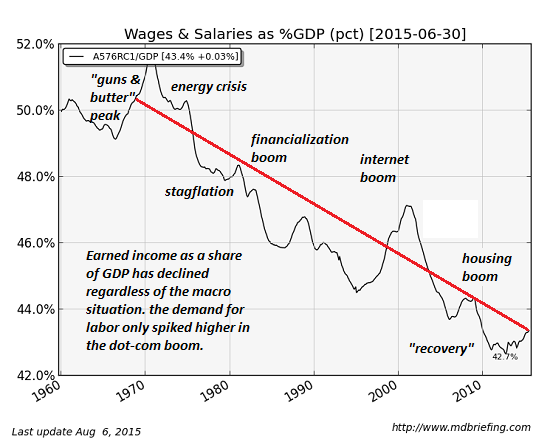
Submitted by Charles Hugh-Smith via OfTwoMinds blog,
Solutions abound, but not within our centralized state-cartel neofeudal system.
Not to rain on the new administration's parade, but one question needs to be asked of any new administration: will tax cuts and more federal borrowing/ spending fix what's broken in the U.S./global economy?
The short answer: if tax cuts and more federal borrowing/ spending were the cure for what ails the economy, we'd have reached Paradise long ago. Stripped of partisan politics and rah-rah, tax cuts and more federal borrowing/ spending--on infrastructure, education, defense, healthcare, you name it--have been the de facto status quo policies of both parties for the past 70 years.
Despite decades of these centralized, standard-issue Keynesian "fixes," the economy's structural ills are only getting worse. I outlined five of the most critical issues in What Have the "Experts" Gotten Right? In the Real Economy, They're 0 for 5 (December 20, 2016).
Ultimately, two dynamics will dominate everything else: the paid work/earnings of non-elites and the transition from wasteful, debt-funded "growth" to a sustainable "Degrowth" economy.
45 years of Keynesian "stimulus"--tax cuts and federal borrowing/ spending--haven't stemmed the decline of labor's share of the economy (GDP). As these charts reveal, if labor's share of the economy was still at 50% rather than 42%, households with earnings from work would be getting an astounding $1.35 trillion more per year.
This equates to an additional $10,800 per household, per year (there are roughly 125 million households in the U.S.) or about $100,000 per household per decade.
[image]https://www.oftwominds.com/photos2016/wages-GDP5-16a.png[/image]
Would you be better off if your household had been paid an extra $100,000 in the 10 years since 2007? I am guessing the answer is "yes."
Is it mere coincidence that while labor's share of GDP declined by $1.35 trillion, corporate profits rose from $400 billion annually to $1.8 trillion? Garsh, do you reckon there's a connection?
[image]https://www.oftwominds.com/photos2016/corp-profits9-16.png[/image]
Another factor is the top 5%'s rising share of earnings. I call this the since I'm doing well, the economy is swell syndrome. The top 5% dominate the managerial class in the media, government, think tanks, foundations and corporate America, and from their perch high atop the centralized pyramid of wealth/power in America, things look just grand.
[image]https://www.oftwominds.com/photos2016/wage-inequality3-16a.jpg[/image]
Things look considerably different from the bottom of the pyramid.
The Powers That Be have three basic fixes for every systemic ill:
1. Concentrate even more power and wealth in the central state
2. Borrow and blow a couple more trillion dollars
3. Guaranteed minimum income for the bottom 95%, which is a politically correct code phrase for:
We're tossing you on the trash heap of society, making sure you have just enough cash to get to the dollar store or Wal-Mart and enough to scrape by so you won't rise up against your "betters" who own all the wealth and income streams.
Sorry, but I think we can do better. In terms of aligning social-economic policy with the emerging economy, I think the real solutions are:
1. Decentralize / devolve power to regional metro areas, cities, towns, communities and neighborhoods. I explain how this works in my book Resistance, Revolution, Liberation: A Model for Positive Change.
I'm not alone in seeing this as the only solution that aligns with the emerging economy. Consider The Most Disruptive Transformation in History: How the clustering of knowledge lays bare the need to devolve power from the nation-state to the city.
2. Align our educational system with the emerging economy and reduce the cost of higher education by 90%. Yes, I know, it can't be done, blah blah blah, we need our buggy whip industry, we'll perish without it, Baumol's Disease, etc. etc. etc.
I explain how to revolutionize education in my book The Nearly Free University and the Emerging Economy.
3. Transform our sick, centralized culture of consumption to a vibrant healthy culture of productive entrepreneurism. As you have probably guessed, I lay out how to do this in my book Get a Job, Build a Real Career and Defy a Bewildering Economy.
4. Create capital and opportunity at the bottom of the pyramid where the 95% live rather than in the apex of the pyramid inhabited by the top .1%. I explain how this would work in my book A Radically Beneficial World: Automation, Technology and Creating Jobs for All.
5. Limit the power of privilege by creating multiple pathways from the low-opportunity disadvantaged class to the abundant-opportunity advantaged class. If you reckon I wrote a book on this, bingo: Inequality and the Collapse of Privilege.
If you suffer from since I'm doing well, the economy is swell syndrome, I suggest taking a look at Why Our Status Quo Failed and Is Beyond Reform.
Solutions abound, but not within our centralized state-cartel neofeudal system. "You never change things by fighting the existing reality. To change something, build a new model that makes the existing model obsolete." R. Buckminster Fuller